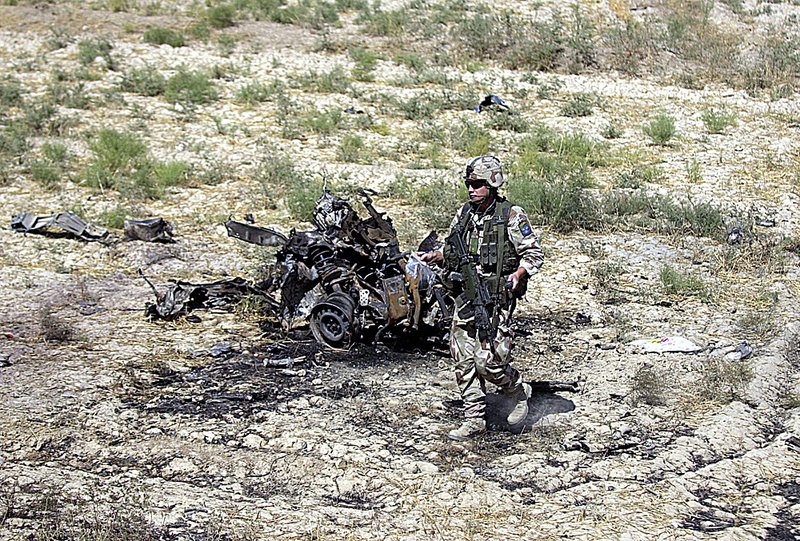KABUL, Afghanistan — Three journalists picked up by coalition forces or the Afghan intelligence service for their suspected links to Taliban propaganda networks have been freed after brief detentions that prompted angry reaction from journalism advocates and President Hamid Karzai’s call for their quick release.
NATO said Friday that it had released Mohammad Nadir, a television cameraman for al-Jazeera, and Rahmatullah Naikzad, who worked for both al-Jazeera and The Associated Press.
“After reviewing the initial intelligence and information received during questioning, the two men were not considered a significant security threat and were released,” said Rear Adm.Gregory Smith, communications director for the NATOled military coalition. “During their brief detention, they were treated humanely and in accordance with international law and U.S. policies.”
“No news agency working in Afghanistan was targeted as part of these operations, and no guilt or innocence is presumed by our activities,” Smith said. “The operations were conducted with our Afghan partners and based on intelligence gathered over an extended period of time, focusing on insurgent propaganda networks and their affiliates.”
Interactive
A third journalist, Hojatullah Mujadadi, a radio station manager in Kapisa province north of Kabul who was being held by Afghan intelligence officials, also has been freed,NATO said. The intelligence service would not say when he was released or disclose information about why Mujadadi was apprehended Sept. 18, the same day as the Afghan parliamentary elections.
Bob Dietz, Asia program coordinator for the New Yorkbased Committee to Protect Journalists, said he thought Karzai’s decision Thursday, instructing the Ministry of Information and Culture to follow up on the detentions and work for the journalists’ freedom, might have sped their release.
He said he didn’t think NATO was doing itself any favors by detaining journalists in the middle of the night.
“All of these men were recognized as legitimate journalists,” Dietz said. “They never should have been detained in the first place.”
Dietz also said media coverage of the detentions might have been a factor in their quick release.
Al-Jazeera, which has extensive contacts within insurgent groups in Iraq and Afghanistan, said Nadir and Naikzad were both innocent. Their contacts with the Taliban should not be viewed as a criminal offense, but rather as a necessary part of their work as journalists.
Nadir said in an interview that after being arrested at his home 4 a.m. Wednesday in Kandahar, coalition forces drove him, handcuffed and blindfolded, less than an hour to a place he later learned was Kandahar Air Field.
He said he was questioned five different times in a small room.
“I was shocked that they were asking me illogical questions like ‘Why are you constantly contacting the Taliban spokesman?’ I said ‘It is my duty to have a link with them because I’m a journalist. Every journalist has contacts with the Taliban - not in the form of helping them, but to get the news from them.”’
During the questioning, Nadir said, he was asked to identify five men in photographs. He said he told them he didn’t know any of them.
When he was released at 6:30 a.m. Friday and escorted to the gate, Nadir said, he was given about $22 so he could get a taxi to his home in the city.
In a telephone call from his home, Naikzad said he was arrested at his home in Ghazni in eastern Afghanistan early Monday.
The coalition said they suspected Naikzad of working with the Taliban to spread insurgent propaganda and film attacks tied to parliamentary elections held last weekend.
Naikzad said he was flown by helicopter to a coalition facility in Gardez, the provincial capital of neighboring Paktia province.
There, two Americans, dressed in civilian clothes, questioned him eight times during his five-day detention, he said.
In other developments, President Barack Obama said Friday that U.S. troops will stay in Afghanistan “until the job is done.”
The president made the comment in an interview Friday with BBC Persian Television, which reaches Persian-speaking audiences in Afghanistan, Iran and elsewhere.
Obama again emphasized that a July 2011 date to begin withdrawing U.S. troops from Afghanistan does not mean the end of America’s commitment to that country.
He said the job in Afghanistan is “to provide Afghans themselves the capacity to secure their own country.” Information for this article was contributed from Kandahar by Mirwais Khan and from Kabul by Amir Shah and Eric Talmadge of The Associated Press.
Front Section, Pages 2 on 09/25/2010
